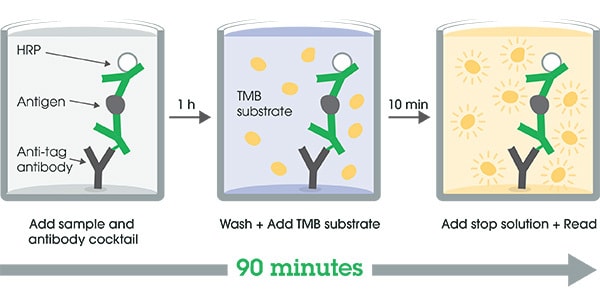Human PAP ELISA Kit (ACPP) (ab267802)
Key features and details
- One-wash 90 minute protocol
- Sensitivity: 9.73 pg/ml
- Range: 37.5 pg/ml - 2400 pg/ml
- Sample type: Cell culture media, Cell culture supernatant, Cit plasma, EDTA Plasma, Hep Plasma, Serum, Urine
- Detection method: Colorimetric
- Assay type: Sandwich (quantitative)
- Reacts with: Human
Overview
-
Product name
Human PAP ELISA Kit (ACPP)
See all PAP kits -
Detection method
Colorimetric -
Precision
Intra-assay Sample n Mean SD CV% Serum 8 3.5% Inter-assay Sample n Mean SD CV% Serum 3 3.4% -
Sample type
Cell culture supernatant, Urine, Serum, Cell culture media, Hep Plasma, EDTA Plasma, Cit plasma -
Assay type
Sandwich (quantitative) -
Sensitivity
9.73 pg/ml -
Range
37.5 pg/ml - 2400 pg/ml -
Recovery
Sample specific recovery Sample type Average % Range Cell culture supernatant 99 82% - 86% Urine 89 81% - 95% Serum 88 84% - 93% Cell culture media 84 89% - 111% Hep Plasma 96 87% - 106% EDTA Plasma 89 81% - 98% Cit plasma 90 80% - 99% -
Assay time
1h 30m -
Assay duration
One step assay -
Species reactivity
Reacts with: Human -
Product overview
Human PAP ELISA Kit (ACPP) (ab267802) is a single-wash 90 min sandwich ELISA designed for the quantitative measurement of PAP (ACPP) protein in cell culture supernatant, edta plasma, hep plasma, serum, urine, cit plasma, and cell culture media. It uses our proprietary SimpleStep ELISA® technology. Quantitate Human PAP (ACPP) with 9.73 pg/ml sensitivity.
SimpleStep ELISA® technology employs capture antibodies conjugated to an affinity tag that is recognized by the monoclonal antibody used to coat our SimpleStep ELISA® plates. This approach to sandwich ELISA allows the formation of the antibody-analyte sandwich complex in a single step, significantly reducing assay time. See the SimpleStep ELISA® protocol summary in the image section for further details. Our SimpleStep ELISA® technology provides several benefits:
- Single-wash protocol reduces assay time to 90 minutes or less
- High sensitivity, specificity and reproducibility from superior antibodies
- Fully validated in biological samples
- 96-wells plate breakable into 12 x 8 wells stripsA 384-well SimpleStep ELISA® microplate (ab203359) is available to use as an alternative to the 96-well microplate provided with SimpleStep ELISA® kits.
-
Notes
PAP (Prostatic Acid Phosphatase, EC:3.1.3.2), also known as ACPP is a non-specific tyrosine phosphatase that dephosphorylates a diverse number of substrates under acidic conditions including alkyl, aryl, and acyl orthophosphate monoesters and phosphorylated proteins. PAP expression is highest in prostate. PAP is biomarker of prostate cancer as its expression is increased in prostate cancer patients. The isoform 1 is secreted, the isoform 2 is a type I integral membrane protein of plasma membrane and lysosomes. The Isoform 2 function as tumor suppressor through dephosphorylation of ERBB2 and deactivation of MAPK-mediated signaling. The antibodies of this kit are designed to detect both isoforms.
-
Platform
Pre-coated microplate (12 x 8 well strips)
Properties
-
Storage instructions
Store at +4°C. Please refer to protocols. -
Components 1 x 96 tests 10X Human PAP (ACPP) Capture Antibody 1 x 600µl 10X Human PAP (ACPP) Detector Antibody 1 x 600µl 10X Wash Buffer PT (ab206977) 1 x 20ml Antibody Diluent 5BI 1 x 6ml Human PAP (ACPP) Lyophilized Recombinant Protein 2 vials Plate Seals 1 unit Sample Diluent NS (ab193972) 1 x 50ml SimpleStep Pre-Coated 96-Well Microplate (ab206978) 1 unit Stop Solution 1 x 12ml TMB Development Solution 1 x 12ml -
Research areas
-
Sequence similarities
Belongs to the histidine acid phosphatase family. -
Cellular localization
Secreted and Lysosome membrane. Predominantly localized in the plasma membrane but also detected in intracellular vesicles. - Information by UniProt
-
Alternative names
- 5' NT
- 5' nucleotidase
- 5'-NT
see all -
Database links
- Entrez Gene: 55 Human
- Omim: 171790 Human
- SwissProt: P15309 Human
- Unigene: 433060 Human
Images
-
SimpleStep ELISA technology allows the formation of the antibody-antigen complex in one single step, reducing assay time to 90 minutes. Add samples or standards and antibody mix to wells all at once, incubate, wash, and add your final substrate. See protocol for a detailed step-by-step guide.
-
The PAP standard curve was prepared as described in Section 10. Raw data values are shown in the table. Background-subtracted data values (mean +/- SD) are graphed.
-
The concentrations of PAP were measured in duplicates, interpolated from the PAP standard curves and corrected for sample dilution. Undiluted samples are as follows: serum 50%, plasma (citrate) 50%, plasma (EDTA) 50% and plasma (heparin) 50%. The interpolated dilution factor corrected values are plotted (mean +/- SD, n=2). The mean PAP concentration was determined to be 406 pg/mL in neat serum, 331 pg/mL in neat plasma (citrate), 282 pg/mL in neat plasma (EDTA) and 417 pg/mL in neat plasma (heparin).
-
 Interpolated concentrations of native PAP in human urine and LNCap cell culture supernatant samples.
Interpolated concentrations of native PAP in human urine and LNCap cell culture supernatant samples.The concentrations of PAP were measured in duplicates, interpolated from the PAP standard curves and corrected for sample dilution. Undiluted samples are as follows: urine 10%, and LNCap cell culture supernatant 25%. The interpolated dilution factor corrected values are plotted (mean +/- SD, n=2). The mean PAP concentration was determined to be 20,039 pg/mL in neat urine and 5,676 pg/mL in neat LNCap cell culture supernatant.
-
Interpolated dilution factor corrected values are plotted (mean +/- SD, n=2). The mean PAP concentration was determined to be 416 pg/mL with a range of 94 – 718 pg/mL.
-
To learn more about the advantages of recombinant antibodies see here.












